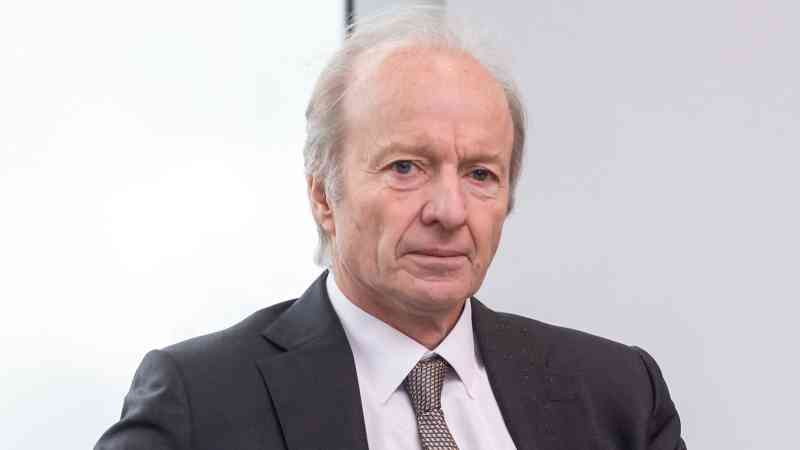FCA chairman did breach his own rules on whistleblowers
The chairman of the Financial Conduct Authority did not follow the letter of the rules when he unmasked a whistleblower to senior colleagues, the regulator ruled today, as it revealed that a second whistleblowing complainant had experienced the same treatment.
The findings on the conduct of Ashley Alder were made in a report by Richard Lloyd, the senior independent director on the FCA board.
Lloyd found that while Alder “did not follow the [whistleblower] policy to the letter”, his actions in both cases were “reasonable” and were made on the basis of a “firm belief that there was no realistic prospect of causing harm” to either whistleblower.
The report disclosed that “a second individual” — who also felt they had their right to anonymity compromised by Alder — had come forward since the first complaint was revealed last month.
In the first case Alder was accused of violating the regulator’s own code of conduct after he forwarded emails from the whistleblower to FCA officials with the whistleblower’s name, address and concerns unredacted.
The whistleblower, a former FCA employee who had been dismissed in 2021 for alleged misconduct, was left “angry, stunned and speechless” when their identity was passed on, according to the Financial Times’s Banking Risk and Regulation service, which first reported the story.
The whistleblower had specifically asked for anonymity in an email to Alder and had referred to the FCA’s guidance to whistleblowers, which says: “Your identity will not be revealed without your consent.”
Alder reportedly forwarded the unredacted correspondence to two other FCA officials in December and March and referenced a third, who briefed others on the matter.
The second individual was also a former FCA official, the report disclosed.
Lloyd, in his report, said that Alder, “in forwarding the emails that he received directly from these two individuals to relevant colleagues internally, reasonably took the view that he was providing information to them of which they were already aware, in order to request advice on the range of matters they contained and to ensure that these were correctly addressed and progressed”.
Lloyd went on: “Whilst the chair did not follow the policy to the letter, for example by asking for consent before seeking internal legal advice, his aim was simply to ensure that appropriate action was taken in respect of all the matters the complainants were raising.
“The chair routinely consults senior managers on sensitive matters, including obtaining legal advice, within strict terms of confidentiality and indeed their roles require those managers to operate under such requirements generally.”
Alder, who has headed the FCA for 18 months, said: “I take our responsibilities to whistleblowers very seriously. These were unusual and complex cases involving two employees who had left the FCA some years ago and who have raised a range of issues over an extended period of time, in one case through multiple public channels. I wanted to ensure that, as non-executive chair, I was in the best position to act on the concerns of both individuals.“To do so, I needed to consult an extremely limited number of senior colleagues and, while I did not follow the policy to the letter, I knew that they would treat all information with utmost care, and there would be no risk of prejudice to the individuals involved.”
Regulatory lawyers have said that the FCA was guilty of a disregard for the standards it expects of the industry it regulates. Improperly unmasking whistleblowers is seen as very serious. The FCA and the Bank of England jointly fined Jes Staley, then chief executive of Barclays, £642,000 for trying to ascertain the identity of a whistleblower in 2018.
The FCA said today it was in the process of reviewing its whistleblower policy. “In the meantime, board members and senior managers have been reminded of the existing policy.”
Behind the story
Investigating the allegations of whistleblowers is difficult. Investigating them without revealing their identities to their managers can be harder still (Patrick Hosking writes).
A chairman trying to distinguish vexatious or dishonest claims from genuine concerns needs to be able to hear both sides of the story.
The Financial Conduct Authority’s chairman, Ashley Alder, has got into a tangle as a result of its promise not to unmask whistleblowers without their consent.
But them’s the rules, and Alder broke them, though the FCA’s senior independent director Richard Lloyd, a former interim chairman of the regulator himself, cannot quite bring himself to explicitly say so.
Alder, he says, merely “did not follow the letter of the rules” though his actions were “reasonable”.That is the kind of defence that the FCA’s own enforcement officers would not accept for a moment from a straying banker or broker.
The watchdogs of Endeavour Square are quite capable of nitpicking over the minutest departure from the rules when it comes to supervising firms. Lloyd, by downplaying the importance of following the letter of the rules, will elicit hollow laughter in compliance departments throughout the City.
One good thing is that the affair will lead to a clarification of the FCA’s whistleblowing code of conduct. The changes, as Alder says, will in future make it “crystal clear that, in circumstances similar to these two cases, non-executive directors must be able to access internal senior advice at the outset.”




Publicar comentario